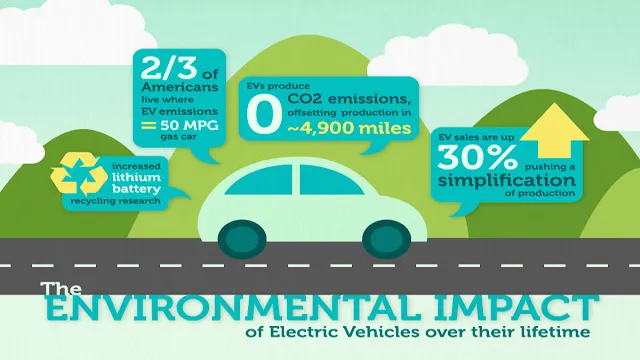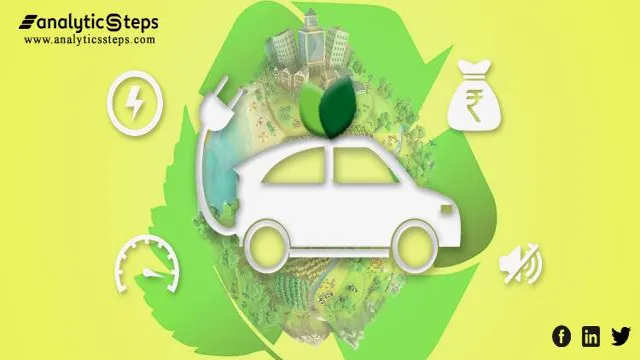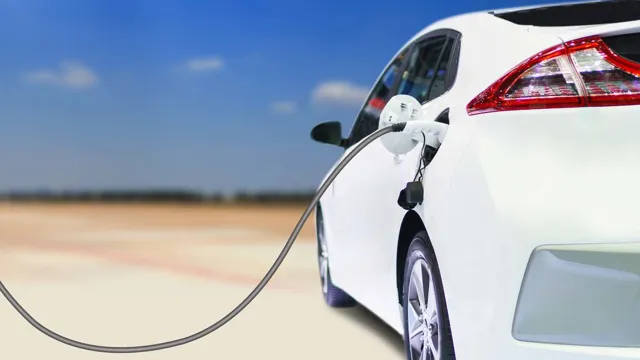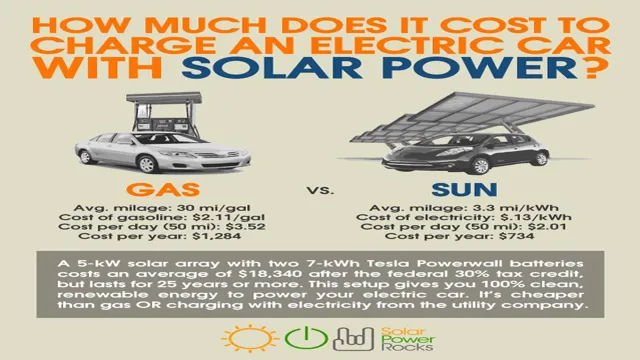Driving towards a cleaner future: The environmental benefits of electric cars
Electric cars have become increasingly popular as people look for more environmentally-friendly options to reduce their carbon footprint. With zero emissions and quiet operation, they provide a promising solution to the problems of air pollution and noise pollution. In addition to these benefits, electric cars also offer several other green advantages, making them a sustainable and viable transportation choice.
In this blog post, we will explore the many green benefits of electric cars and what they can do for our planet. So, buckle up and let’s explore how electric cars can help us lead a more eco-friendly lifestyle!
Zero Emissions
Electric cars are becoming more and more prevalent as people look for ways to reduce their carbon footprint and help the environment. They are zero-emissions vehicles that do not emit harmful gases into the atmosphere, which is a huge benefit for the environment. In contrast, traditional gasoline-powered vehicles contribute to air pollution, greenhouse gases, and climate change.
By driving an electric car, you can reduce your reliance on fossil fuels and decrease your carbon footprint. Additionally, electric cars have lower operating costs and require less maintenance than traditional cars. However, they do require a source of electricity to charge their batteries, so it is important that the electricity is generated from renewable sources like wind or solar.
Overall, electric cars can make a significant contribution to the environment and help to combat climate change.
Electric cars produce no greenhouse gases or emissions that pollute the air and harm the environment.
As our world faces mounting environmental challenges, electric cars represent a promising solution by producing no greenhouse gases or other harmful emissions that pollute our air and harm our planet. Unlike conventional cars that rely on gasoline or diesel to fuel their engines, electric cars run on rechargeable batteries that make them not only emission-free but also much quieter. According to recent studies, electric cars can help reduce overall greenhouse gas emissions by up to 50% compared to gasoline-powered vehicles.
This means that by driving an electric car, you can play an active role in combating climate change and improving air quality in your community. What’s more, electric cars are becoming increasingly accessible to consumers, with many models now available at prices comparable to traditional cars. So why not join the electric car revolution and start contributing to a cleaner, more sustainable future for all?

They can significantly reduce the amount of carbon dioxide in the atmosphere.
Zero Emissions When it comes to fighting climate change, reducing carbon dioxide in the atmosphere is critical. One of the most promising ways to achieve this goal is through zero emissions. Zero emissions simply means that no pollutants are being released into the atmosphere.
This includes carbon dioxide, which is one of the primary greenhouse gases that contribute to global warming. By transitioning to zero-emissions technology, we can significantly reduce the amount of carbon dioxide in the atmosphere and help slow the effects of climate change. Not only will this help protect our environment, but it will also create new opportunities for innovation and job growth in clean energy industries.
Let’s work together to achieve zero emissions and build a better, healthier world for future generations.
Reduced Dependence on Fossil Fuels
Electric cars have the potential to significantly benefit the environment by reducing our dependence on fossil fuels. Fossil fuels, such as oil and gas, are major contributors to air and water pollution, and their extraction and transport can have detrimental impacts on local ecosystems. Electric cars, on the other hand, rely on renewable energy sources, such as electricity generated from solar, wind, or hydro power, to power their engines.
This reduces greenhouse gas emissions and helps to mitigate the impacts of climate change. Additionally, the production of electric cars has a smaller carbon footprint than traditional gas-powered vehicles, as the manufacturing process produces fewer emissions. As more people switch to electric cars, we can all contribute to a healthier and more sustainable future for our planet.
Electric cars can be powered by renewable energy sources, such as wind or solar power.
Electric cars are a great way to reduce our dependence on fossil fuels, but did you know that they can also be powered by renewable energy sources such as wind or solar power? By using renewable energy to power electric cars, we can further reduce our carbon footprint and protect the environment. Renewable energy sources like wind and solar power are unlimited, unlike fossil fuels, which are finite resources that are becoming increasingly difficult to extract. Using renewable energy to power electric cars is not only better for the environment, but it will also help to reduce our dependence on foreign oil.
Electric cars are becoming more and more popular, and as they do, more and more renewable energy sources are being developed to power them. There are already many charging stations that use renewable energy, and more are being built every day. So, the next time you’re trying to decide whether to purchase an electric car, consider choosing one that can be powered by renewable energy.
By doing so, you’ll not only be protecting the environment, but you’ll also be supporting the growth of renewable energy sources and reducing our dependence on fossil fuels.
Reducing dependence on fossil fuels can help prevent oil spills and other environmental disasters.
Reducing dependence on fossil fuels is crucial in preventing environmental disasters like oil spills. Fossil fuels are non-renewable resources that harm not only the environment but also human health. Overreliance on these fuels results in offshore oil drilling, transportation, and storage, which inevitably lead to oil spills.
The disastrous effect of oil spills can be long-lasting, impacting marine life, ecosystems, and even local economies. By reducing our dependence on fossil fuels, we can decrease the demand for offshore drilling and transportation, ultimately reducing the likelihood of oil spills. Alternative sources of energy, such as wind, solar, and hydropower, offer promising solutions in reducing dependence on fossil fuels.
These alternative sources can help us move toward sustainable and eco-friendly solutions while also promoting economic growth and job creation. It’s time to focus on renewable energy sources and reduce our dependence on fossil fuels to prevent environmental disasters like oil spills.
Increased Efficiency
Electric cars are a great way to reduce our environmental impact. One of the many ways they do this is by increasing efficiency. While gasoline-powered cars typically use only about 20% of the energy from their fuel to actually move the car, electric cars can use up to 80% of their energy for that same purpose.
This means that less energy is wasted and more of it is used to propel the car forward. Additionally, electric cars have regenerative braking, which means that when the brakes are applied, the kinetic energy that would normally be lost in the form of heat is instead converted into electrical energy and stored in the car’s battery. This not only increases efficiency but also reduces the wear and tear on the car’s brakes.
Overall, electric cars are a great way to reduce emissions and increase efficiency in our transportation systems.
Electric cars are often more efficient than traditional gasoline-powered cars.
Electric cars have been making waves in the automotive market, and for good reason. One of their biggest advantages over traditional gasoline-powered cars is their increased efficiency. Electric cars are able to convert a much higher percentage of the energy stored in their batteries into forward motion, compared to gasoline-powered cars, where most of the energy is lost as heat.
This means that electric cars can travel further on the same amount of energy, ultimately making them more cost-effective and environmentally friendly. Additionally, electric cars are able to recapture some of the energy lost during braking, which can then be used to power the car, further increasing efficiency. While there are still areas where gasoline-powered cars have advantages, such as quick refueling times, the increased efficiency of electric cars makes them an appealing option for those looking to reduce their carbon footprint and save money on gas.
They can use up to 80% of their energy to move the car forward, compared to only 20% for gasoline cars.
When it comes to efficiency, electric cars have a clear advantage over their gasoline-powered counterparts. Thanks to their advanced technology, electric cars can use up to 80% of their energy to move the car forward, compared to only 20% for gasoline cars. This means that electric cars are much more efficient, and as a result, they require less energy to travel the same distance.
This increased efficiency translates into a number of benefits for electric car drivers, including reduced energy costs and a longer driving range. Additionally, electric cars produce no emissions, which means that they are not only better for the environment but also for the health of the people living nearby. So if you’re looking for a vehicle that is both efficient and eco-friendly, an electric car may be just what you’re looking for.
Conclusion
In conclusion, electric cars offer a brilliant solution to protecting our environment. By eliminating the harmful pollutants emitted from traditional gas-powered vehicles, electric cars have the potential to clean up our air and reduce our carbon footprint. Plus, with innovative advancements in battery technology and charging infrastructure, driving an electric car has never been more convenient or cost-effective.
So, let’s all charge up our engines and drive towards a greener, cleaner future!”
Electric cars offer a multitude of green benefits, from zero emissions and reduced dependence on fossil fuels to increased efficiency.
When it comes to electric cars, one of the main benefits is how efficient they are. Unlike traditional gasoline-powered vehicles, electric cars are incredibly energy-efficient, meaning they can travel further on a single charge than a gas-powered car can on a tank of fuel. In fact, studies have shown that electric cars can be up to three times more efficient than gas-powered vehicles, with a much higher percentage of the energy stored in their batteries actually being used to power the car.
This not only reduces carbon emissions but also helps drivers save money on fuel costs, making electric cars a smart choice for both the environment and your wallet. Plus, with the growing prevalence of public charging stations, it’s becoming easier than ever to keep your electric car charged up and ready to go whenever you need it. So if you’re looking for an eco-friendly and efficient way to get around, consider investing in an electric car today.
FAQs
What are the advantages of using electric cars over traditional vehicles from an environmental standpoint?
Electric cars have the potential to significantly reduce greenhouse gas emissions, as they produce no emissions when running on electricity. This means they can help combat air pollution and global warming.
Is it more expensive to operate an electric car compared to a gas car in terms of environmental impact?
While the initial purchase cost of an electric car may be higher than a traditional vehicle, the lifetime costs are often lower due to savings in fuel costs and reduced maintenance. Additionally, electric cars have a smaller carbon footprint overall, meaning they are more environmentally friendly.
Can electric cars be powered by renewable energy sources?
Electric cars can be powered by any source of electricity, including renewable energy such as solar, wind, hydro, or geothermal power. This means that electric cars can be part of a sustainable energy system that reduces carbon emissions and benefits the environment.
How do the batteries used in electric cars affect the environment?
While the production and disposal of electric car batteries can have some environmental impacts, the overall benefits of using electric cars with rechargeable batteries far outweigh the negatives. As battery technology continues to improve, the environmental impact of electric cars will continue to decrease over time.



